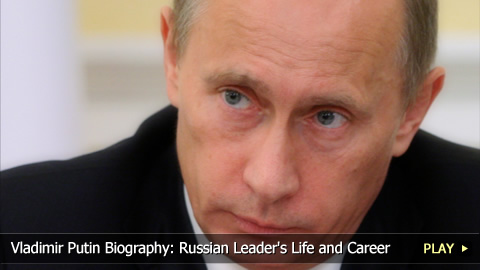Vladimir Putin Biography: Russian Leader's Life and Career

Early Years
Vladimir Vladimirovich Putin was born October 7th, 1952 in what is now St. Petersburg, Russia. While at university, he joined the Communist Party of Soviet Russia and befriended his mentor Anatoly Sobchak. In 1975, he graduated from Leningrad State University with a law degree and began training for the Soviet security agency known as the KGB.
KGB
Beginning in 1985, he spent five years as a spy in East Germany. After returning to Leningrad, he stayed with the KGB and worked as a surveillance officer at his alma mater.
Anatoly Sobchak
But, he retired from the State Security Committee in August ’91 as a Lieutenant colonel. By the time the USSR fell, Putin had reconnected with Sobchak, who was by then the mayor of Leningrad. Putin joined his government as an advisor.
First Deputy Mayor of Leningrad
He then became head of the Committee for External Relations. Though Putin almost lost the job over a scandal involving humanitarian aid, in 1994 he was named first deputy mayor.
Head of the Security Council
Two years later, Putin moved to Moscow after Sobchak lost his reelection bid, and joined Russian President Boris Yeltsin’s government at the Kremlin. By 1998 Yeltsin named him head of the FSB, which was the successor agency to the KGB. Within a year, he was also head of the influential Security Council.
Prime Minister of Russia
Yeltsin made clear he wanted Putin to succeed him, and on August 9th, 1999 that plan was initiated when Yeltsin appointed the unknown Putin as Prime Minister of Russia.
A Decisive Leader
Though he was initially seen by the public as a puppet of the sickly Yeltsin, Putin soon earned praise for his decisive military response to revolutionary secessionists during the ongoing Second Chechen War. His reserved and sober demeanor was welcomed by many, after years of Yeltsin’s inconsistency.
President of Russia
Yeltsin confirmed his unpredictability on December 31st, 1999, when he suddenly stepped down as President. Putin became acting President, and by March he was elected as such by 53 percent of the voting population.
First Term
During his first term, Putin worked to end corruption, unite control of the country and to establish a tightly-run market economy. He also stripped some of the country’s disliked and wealthy business magnates of their power by prosecuting a few and by shutting down select media organizations. After a slump in the ‘90s, the Russian economy also saw a boost during Putin’s reign.
Record Approval Ratings
Putin enjoyed record approval ratings, even in the wake of disasters like 2002’s Moscow theater hostage crisis where over 100 innocent prisoners were killed by Russian forces.
International Relations
His international relations remained strong, especially with France’s Jacques Chirac. Putin even managed to stay on solid ground with George W. Bush’s United States after coming out against the American-led War on Terror.
Second Term
Because of his successes, Putin had no trouble winning a second term in 2004. Though he continued his development of Russian social and economic programs, in 2006 he was criticized by western sources for allegedly attacking freedom of the press in his country after a journalist’s death.
Person of the Year
Just the next year, Putin’s United Russia earned a huge majority in parliament, though some questioned the legitimacy of this vote. Regardless, Time magazine named him person of the year for 2007.
Back as PM
Because of constitutional rules, Putin was unable to run for a third term in 2008. So, in May that year, Putin resumed his role as PM when Dmitry Medvedev came on as President.
Third Term as President
Russia was soon crippled by the world financial crisis, and Medvedev suggested Putin return as President for 2012. Widespread protests swept the country leading up to the election in opposition to Putin’s administration, but those demonstrations were offset by counter-protests in Putin’s favor. On March 4th, 2012, amid charges of voter fraud, Putin was elected to his third term as President.
Legacy
Though he has been accused of corruption and favoritism, Putin successfully turned the Russian economy around, boosted industry and proved himself as one of the most macho world leaders. He also helped land the 2014 Winter Olympics for Sochi, Russia, so there is no doubt that Vladimir Putin has solidified his place in history.


 0
0
 0
0
 report
report